Compiling and bundling JavaScript, the painless way
Michele Riva
Michele Riva
Senior Software Architect @NearForm
Google Developer Expert
Microsoft MVP

MicheleRivaCode





Real-World Next.js
Build scalable, high performances and modern web applications using Next.js, the React framework for production
MicheleRivaCode


Compiling and bundling JavaScript
is (often) a pain*
*but it shouldn't
MicheleRivaCode

A bit of terminology: compiling
to change a computer program into a machine language
Cambridge Dictionary
MicheleRivaCode

A bit of terminology: compiling transpiling
to translate a source code into a different language source code
Me, myself
MicheleRivaCode

A bit of terminology: bundling
to encapsulate code and resources into a single executable file
Me, myself
MicheleRivaCode

Why do we want to transpile our code?
- To make it compatible with different platforms
- To write our scripts in different languages
- To adopt new language features
- To run large-scale refactors
MicheleRivaCode







MicheleRivaCode


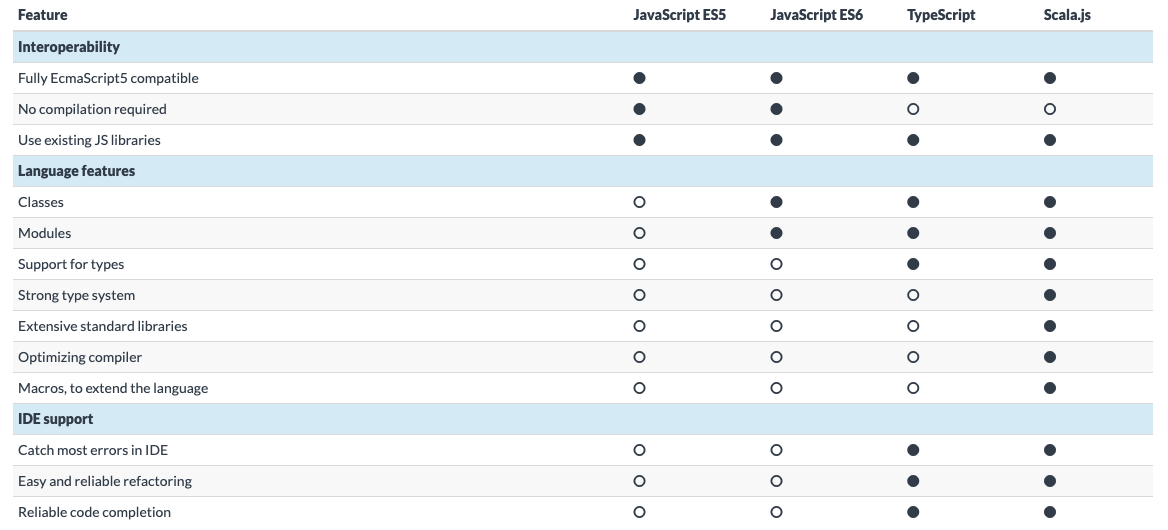
Scala.js
https://www.scala-js.org
MicheleRivaCode


ReasonML

ReScript

F# (via Fable)
Gleam

Elm

Kotlin
Nim, Haxe, C/C++ (via Emscripten), ClojureScript, Dart, PureScript, Haskell (via GHCJS)
MicheleRivaCode

MicheleRivaCode


LLVM
MicheleRivaCode


function toUpper(x) {
return x.toUpperCase();
}
function addExclamationMarks(x) {
return x + '!!!'
}
function scream(input) {
return input
|> toUpper
|> addExclamationMarks
|> console.log
}
scream('Hello, Serbia');
// HELLO, SERBIA!!!"use strict";
function toUpper(x) {
return x.toUpperCase();
}
function addExclamationMarks(x) {
return x + '!!!';
}
function scream(input) {
var _ref, _ref2, _input;
return _ref = (
_ref2 = (_input = input, toUpper(_input)),
addExclamationMarks(_ref2)
), console.log(_ref);
}
scream('Hello, Serbia');
// HELLO, SERBIA!!!MicheleRivaCode

import { VFC } from 'react';
enum UserType {
ADMIN = "admin",
EDITOR = "editor",
USER = "user",
ANONYMOUS = "guest"
}
type MyProps = {
userType: UserType;
}
const MyComponent: VFC<MyProps> = ({ userType }) => {
return (
<div>
User is of type: {props.userType}
</div>
)
}"use strict";
Object.defineProperty(exports, "__esModule", {
value: true
});
var UserType;
(function (UserType) {
UserType["ADMIN"] = "admin";
UserType["EDITOR"] = "editor";
UserType["USER"] = "user";
UserType["ANONYMOUS"] = "guest";
})(UserType || (UserType = {}));
const MyComponent = ({ userType }) => {
return /*#__PURE__*/ React.createElement(
"div",
null,
"User is of type: ",
props.userType
);
};

MicheleRivaCode

Why do we want to bundle our code?
- To create a single executable file
- To serve a single JS file over the net
MicheleRivaCode





MicheleRivaCode


ReadArticle.jsx

NewArticle.jsx

AuthorProfile.jsx

BundledPage.js
MicheleRivaCode

in depths
transpiling
MicheleRivaCode

Language-to-language
ClojureScript
(defn simple-component []
[:div
[:p "I am a component!"]
[:p.someclass
"I have " [:strong "bold"]
[:span {:style {:color "red"}} " and red "] "text."]])cljs.user.simple_component = (function cljs$user$simple_component(){
return new cljs.core.PersistentVector(null, 3, 5, cljs.core.PersistentVector.EMPTY_NODE,
[new cljs.core.Keyword(null,"div","div",(1057191632)),
new cljs.core.PersistentVector(null, 2, 5, cljs.core.PersistentVector.EMPTY_NODE,
[new cljs.core.Keyword(null,"p","p",(151049309)),"I am a component!"], null),
new cljs.core.PersistentVector(null, 5, 5, cljs.core.PersistentVector.EMPTY_NODE,
[new cljs.core.Keyword(null,"p.someclass","p.someclass",(-1904646929)),
"I have ",new cljs.core.PersistentVector(null, 2, 5, cljs.core.PersistentVector.EMPTY_NODE,
[new cljs.core.Keyword(null,"strong","strong",(269529000)),"bold"], null),
new cljs.core.PersistentVector(null, 3, 5, cljs.core.PersistentVector.EMPTY_NODE,
[new cljs.core.Keyword(null,"span","span",(1394872991)),
new cljs.core.PersistentArrayMap(null, 1, [new cljs.core.Keyword(null,"style","style",(-496642736)),
new cljs.core.PersistentArrayMap(null, 1, [
new cljs.core.Keyword(null,"color","color",(1011675173)),"red"]
, null)], null)," and red "], null),"text."], null)], null);
});
https://reagent-project.github.io
MicheleRivaCode

[@bs.config {jsx: 3}];
module Greeting = {
[@react.component]
let make = () => {
<button> {React.string("Hello!")} </button>
};
};
ReactDOMRe.renderToElementWithId(<Greeting />, "preview");// Generated by BUCKLESCRIPT, PLEASE EDIT WITH CARE
'use strict';
var React = require("react");
var ReactDOMRe = require("./stdlib/reactDOMRe.js");
function _none_$Greeting(Props) {
return React.createElement("button", undefined, "Hello!");
}
var Greeting = {
make: _none_$Greeting
};
ReactDOMRe.renderToElementWithId(React.createElement(_none_$Greeting, { }), "preview");
exports.Greeting = Greeting;
/* Not a pure module */
https://reasonml.github.io
Language-to-language
ReasonML
MicheleRivaCode

Language-to-language
TypeScript
import { VFC } from 'react';
enum UserType {
ADMIN = "admin",
EDITOR = "editor",
USER = "user",
ANONYMOUS = "guest"
}
type MyProps = {
userType: UserType;
}
const MyComponent: VFC<MyProps> = ({ userType }) => {
return (
<div>
User is of type: {props.userType}
</div>
)
}"use strict";
Object.defineProperty(exports, "__esModule", {
value: true
});
var UserType;
(function (UserType) {
UserType["ADMIN"] = "admin";
UserType["EDITOR"] = "editor";
UserType["USER"] = "user";
UserType["ANONYMOUS"] = "guest";
})(UserType || (UserType = {}));
const MyComponent = ({ userType }) => {
return /*#__PURE__*/ React.createElement(
"div",
null,
"User is of type: ",
props.userType
);
};
MicheleRivaCode

Every language has its own transpiler

TypeScript TSC

Fable

ClojureScript

BuckleScript

JavaScript (Babel)
MicheleRivaCode

Problem #1
transpilation time

Really fast

Average

Fast
Slow on large codebases


Slow on large codebases
MicheleRivaCode

Problem #2
optimized output

Beautifully optimized

Awful

Beautifully optimized
Quite optimized


Well optimized*
MicheleRivaCode

Let's focus on the most popular ones
Quite slow, quite optimized


Quite fast, well optimized*
MicheleRivaCode

Bundling time grows
Quite slow, quite optimized


Quite fast, well optimized
MicheleRivaCode

MicheleRivaCode

How does a transpiler work?
MicheleRivaCode

Parsing
Transformation
Codegen
MicheleRivaCode

Parsing
Step 1
Tokenization
var foo = 10var
foo
=
10input
tokens
MicheleRivaCode

Parsing
Step 2
Syntactic Analysis
var foo = 10 =
/ \
/ \
var 10
|
fooinput
parse tree
(aka concrete syntax tree)
MicheleRivaCode

Parsing
Step 2
Syntactic Analysis
var foo = 10 =
/ \
/ \
var 10
|
fooinput
variableDeclaration
|
|
vairiableDeclarator
/ \
/ \
Identifier NumericLiteralabstract syntax tree (AST)
MicheleRivaCode


MicheleRivaCode

{
"body":[
{
"type":"VariableDeclaration",
"declarations":[
{
"type":"VariableDeclarator",
"id":{
"type":"Identifier",
"name":"foo",
"loc":{
"identifierName":"foo"
}
},
"init":{
"type":"NumericLiteral",
"extra":{
"rawValue":10,
"raw":"10"
},
"value":10
}
}
],
"kind":"var"
}
]
}MicheleRivaCode


MicheleRivaCode

export default function () {
return {
visitor: {
VariableDeclaration(path) {
console.log({ VariableDeclaration: path.node });
// { type: "VariableDeclaration", kind: "var", ... }
},
Identifier(path) {
console.log({ Identifier: path.node });
// { type: "Identifier", name: "foo", ... }
},
NumericLiteral(path) {
console.log({ NumericLiteral: path.node });
// { type: "NumericLiteral", value: 10, ... }
}
}
};
}
Traversing the AST
Babel example implementing the visitor pattern
MicheleRivaCode

export default function() {
return {
visitor: {
VariableDeclaration(path) {
if (path.node.kind === "var") {
path.node.kind = "let"
}
}
}
};
}
Transforming
Babel example
MicheleRivaCode

Codegen
Babel example
input
output
var foo = 10
const bar = truelet foo = 10;
const bar = true;MicheleRivaCode


ESLint

jscodeshift

Prettier
MicheleRivaCode


ESLint
export default function(context) {
return {
TemplateLiteral(node) {
context.report({
node,
message: 'Do not use template literals',
fix(fixer) {
if (node.expressions.length) {
// Can't auto-fix template literal with expressions
return;
}
return [
fixer.replaceTextRange([node.start, node.start + 1], '"'),
fixer.replaceTextRange([node.end - 1, node.end], '"'),
];
},
});
}
};
};
Example code taken from astexplorer.net
MicheleRivaCode


ESLint
const myString = `Hello, World!`;const myString = "Hello, World!";input
output
MicheleRivaCode

ttypescript (https://github.com/cevek/ttypescript)
export default function (program) {
const checker = program.getTypeChecker();
return (context) => {
return (sourceFile) => {
const visitor = (node) => {
// This branch evaluates '2 + 2' like expressions and replaces the node with the result (in this case '4')
if (ts.isBinaryExpression(node)) {
if (ts.isNumericLiteral(node.left) && ts.isNumericLiteral(node.right)) {
// We could parse `node.text` as a number, or we can use the typechecker to get type info for nodes
const lhs = checker.getTypeAtLocation(node.left);
const rhs = checker.getTypeAtLocation(node.right);
switch (node.operatorToken.kind) {
case ts.SyntaxKind.PlusToken:
return context.factory.createNumericLiteral(lhs.value + rhs.value);
}
}
}
//
if (ts.isIdentifier(node) && node.text === 'printTips' || node.text === 'tips') {
return context.factory.createIdentifier(node.text.split('').reverse().join(''));
}
return ts.visitEachChild(node, visitor, context);
};
return ts.visitNode(sourceFile, visitor);
};
};
};
Example code taken from https://github.com/cevek/ttypescript#program
MicheleRivaCode

ttypescript (https://github.com/cevek/ttypescript)
input
output
const mySum = 10 + 20;const mySum = 30;MicheleRivaCode

export const parser = "babel";
export default function transformer(file, api) {
const j = api.jscodeshift;
return j(file.source)
.find(j.Identifier)
.forEach((path) => {
if (j(path).get().value.name.includes("oldName")) {
j(path).replaceWith(
j.identifier(path.node.name.replace("oldName", "newName"))
);
}
})
.toSource();
}
jscodeshift
MicheleRivaCode

jscodeshift
const oldNameFactory = () => {/* */};const newNameFactory = () => {/* */};input
output
MicheleRivaCode

Desired output
input
output
import MyHeader from 'components/MyHeader';
export function MyApp(props) {
return (
<div>
<MyHeader {...props.headerProps} />
<p> Hello, {props.name}!</p>
</div>
)
}export function MyApp(props) {
return (
<div>
<p> Hello, {props.name}!</p>
</div>
)
}MicheleRivaCode

export const parser = 'babel'
export default function transformer(file, api) {
const j = api.jscodeshift;
const withoutElement = j(file.source)
.find(j.JSXElement)
.forEach(function (path) {
if (path.value.openingElement.name.name === "MyHeader") {
path.prune();
}
})
.toSource();
const withoutImport = j(withoutElement)
.find(j.ImportDefaultSpecifier)
.forEach(function (path) {
if (path.value.local.name === "MyHeader") {
path.parentPath.parentPath.prune();
}
})
.toSource();
return withoutImport;
};MicheleRivaCode

const user = {
data: {
name: {
first: "Michele",
last: "Riva"
}
}
}
const middleName = user.data
&& user.data.name
&& user.data.name.middle
|| "No middle name";
console.log(middleName);Node 12.x
No middle nameMicheleRivaCode

const user = {
data: {
name: {
first: "Michele",
last: "Riva"
}
}
}
const middleName = user.data?.name?.middle ?? "No middle name";
console.log(middleName);Node 12.x
SyntaxError: Unexpected token '.'MicheleRivaCode

const user = {
data: {
name: {
first: "Michele",
last: "Riva"
}
}
}
const middleName = user.data?.name?.middle ?? "No middle name";
console.log(middleName);Node >14.x
"No middle name"MicheleRivaCode

import get from 'lodash/get';
const user = {
data: {
name: {
first: "Michele",
last: "Riva"
}
}
}
const middleName = get(user, "data.name.middle", "No middle name");
console.log(middleName);"No middle name"MicheleRivaCode

import reverse from 'lodash/reverse';
import isString from 'lodash/isString';
import isFunction from 'lodash/isFunction';
import isNull from 'lodash/isNull';
import split from 'lodash/split';
import filter from 'lodash/filter';
import map from 'lodash/map';
import keys from 'lodash/keys';
// and so on...MicheleRivaCode

import reverse from 'lodash/reverse';
// Array.reverse()
import isString from 'lodash/isString';
// typeof
import isFunction from 'lodash/isFunction';
// typeof
import isNull from 'lodash/isNull';
// typeof
import split from 'lodash/split';
// Array.split()
import filter from 'lodash/filter';
// Array.filter
import map from 'lodash/map';
// Array.map
import keys from 'lodash/keys';
// Object.keys
// and so on...MicheleRivaCode

What if we have thousands of files to refactor?
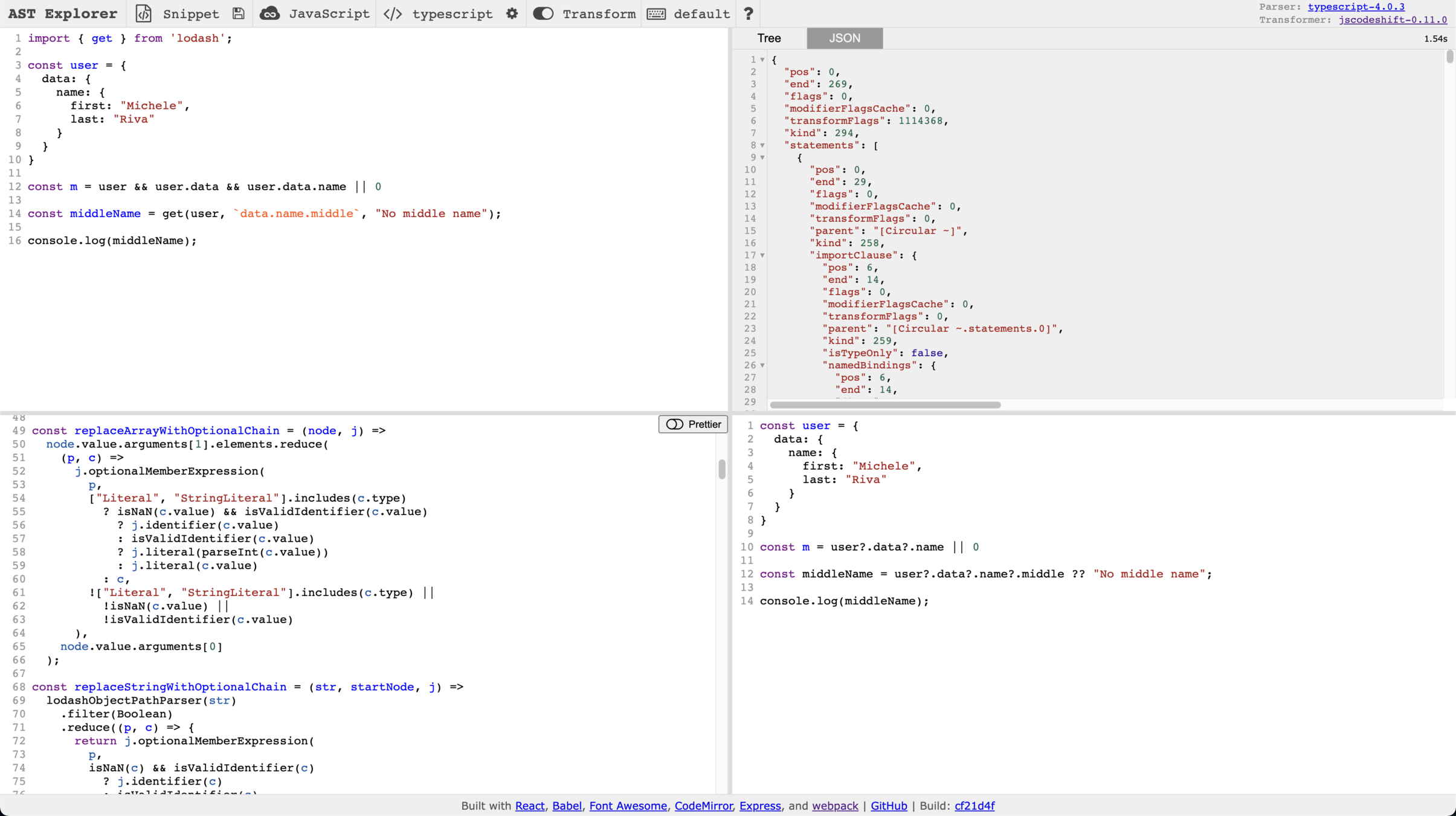
MicheleRivaCode


MicheleRivaCode

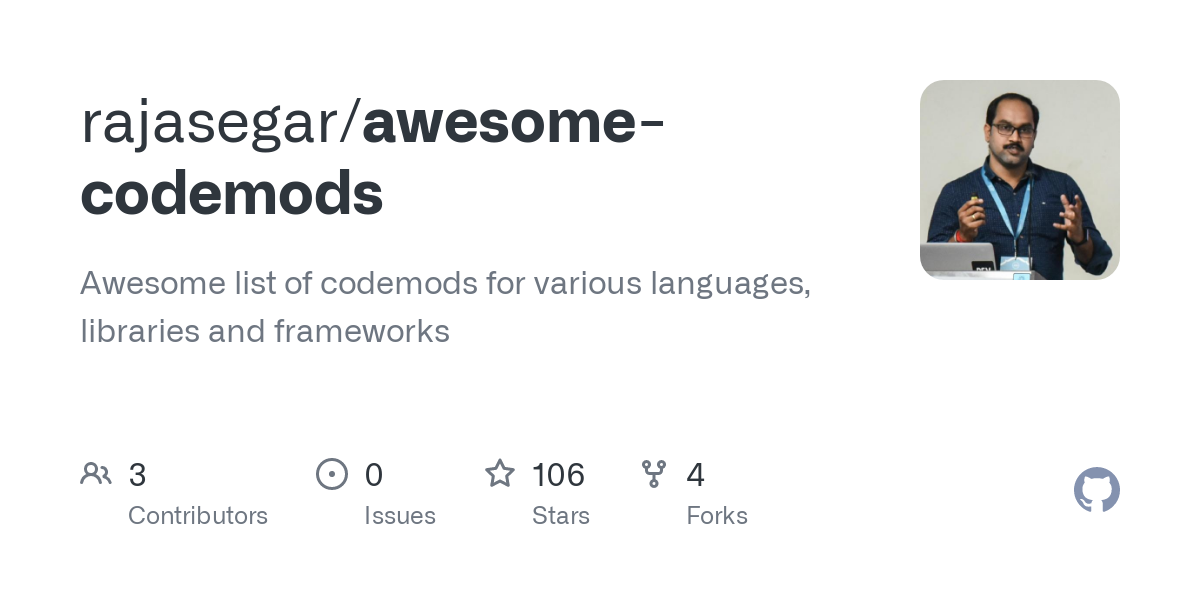
MicheleRivaCode

in depths
bundling
WebPack
Parcel

Rollup
MicheleRivaCode

Hard
Easier
Easiest
WebPack
Parcel

Rollup
MicheleRivaCode

Hard
Easier
Easiest
Slowest
Slower
Fast
WebPack
Parcel

Rollup
MicheleRivaCode

king of configurations
MicheleRivaCode

king of configurations
Is it still worth it?
MicheleRivaCode


ESBuild

SWC

Vite

Snowpack
is there any better alternative?
(rest in pepperoni)
MicheleRivaCode

esbuild src/myEntry.js --bundle --sourcemap --minify --outfile=dist/mybundle.js
ESBuild
MicheleRivaCode


MicheleRivaCode

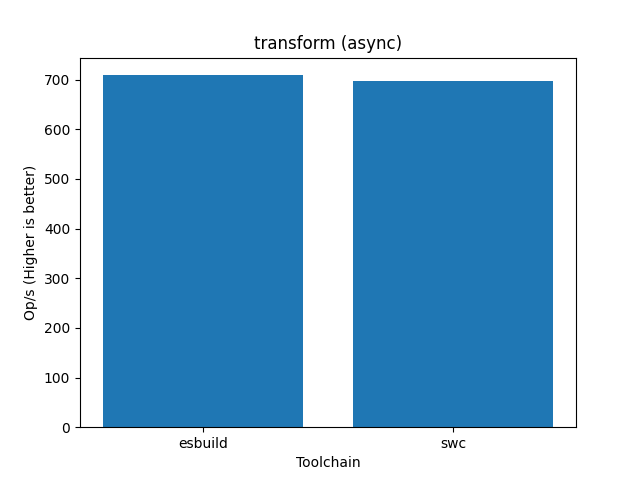
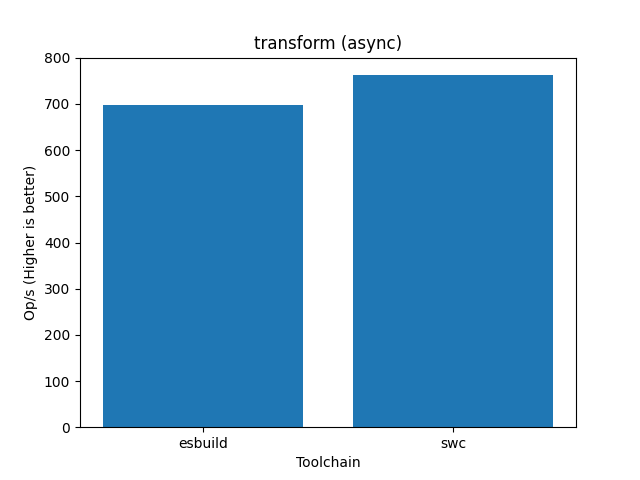
ES2019
ES2020

{
"jsc": {
"parser": {
"syntax": "ecmascript",
"jsx": false,
"dynamicImport": false,
"privateMethod": false,
"functionBind": false,
"exportDefaultFrom": false,
"exportNamespaceFrom": false,
"decorators": false,
"decoratorsBeforeExport": false,
"topLevelAwait": false,
"importMeta": false
},
"transform": null,
"target": "es5",
"loose": false,
"externalHelpers": false,
// Requires v1.2.50 or upper and requires target to be es2016 or upper.
"keepClassNames": false
}
}MicheleRivaCode


SWC can run in a browser thanks to WASM
MicheleRivaCode


Vite
MicheleRivaCode


Vite

MicheleRivaCode


Vite


MicheleRivaCode

// ESM
export default function greet() {
return "Hello Serbia!";
}
// ESM
import foo, { bar } from "foobar";// CJS
module.exports = function greet() {
return "Hello Serbia!";
}
// CJS
const foo, { bar } = require("foobar");MicheleRivaCode


Vite
MicheleRivaCode


MicheleRivaCode

rest in pepperoni

Snowpack
MicheleRivaCode


Snowpack

rest in pepperoni
MicheleRivaCode


Snowpack


rest in pepperoni
MicheleRivaCode

MicheleRivaCode

/*
* Skypack CDN - canvas-confetti@1.4.0
*
* Learn more:
* 📙 Package Documentation: https://www.skypack.dev/view/canvas-confetti
* 📘 Skypack Documentation: https://www.skypack.dev/docs
*
* Pinned URL: (Optimized for Production)
* ▶️ Normal: https://cdn.skypack.dev/pin/canvas-confetti@v1.4.0-POmgSMO0U5q84otJfYlN/mode=imports/optimized/canvas-confetti.js
* ⏩ Minified: https://cdn.skypack.dev/pin/canvas-confetti@v1.4.0-POmgSMO0U5q84otJfYlN/mode=imports,min/optimized/canvas-confetti.js
*
*/
// Browser-Optimized Imports (Don't directly import the URLs below in your application!)
export * from '/-/canvas-confetti@v1.4.0-POmgSMO0U5q84otJfYlN/dist=es2020,mode=imports/optimized/canvas-confetti.js';
export {default} from '/-/canvas-confetti@v1.4.0-POmgSMO0U5q84otJfYlN/dist=es2020,mode=imports/optimized/canvas-confetti.js';MicheleRivaCode


MicheleRivaCode

The future is no-bundle
MicheleRivaCode

The future is no-bundle*
*maybe
MicheleRivaCode

The future is bright
MicheleRivaCode

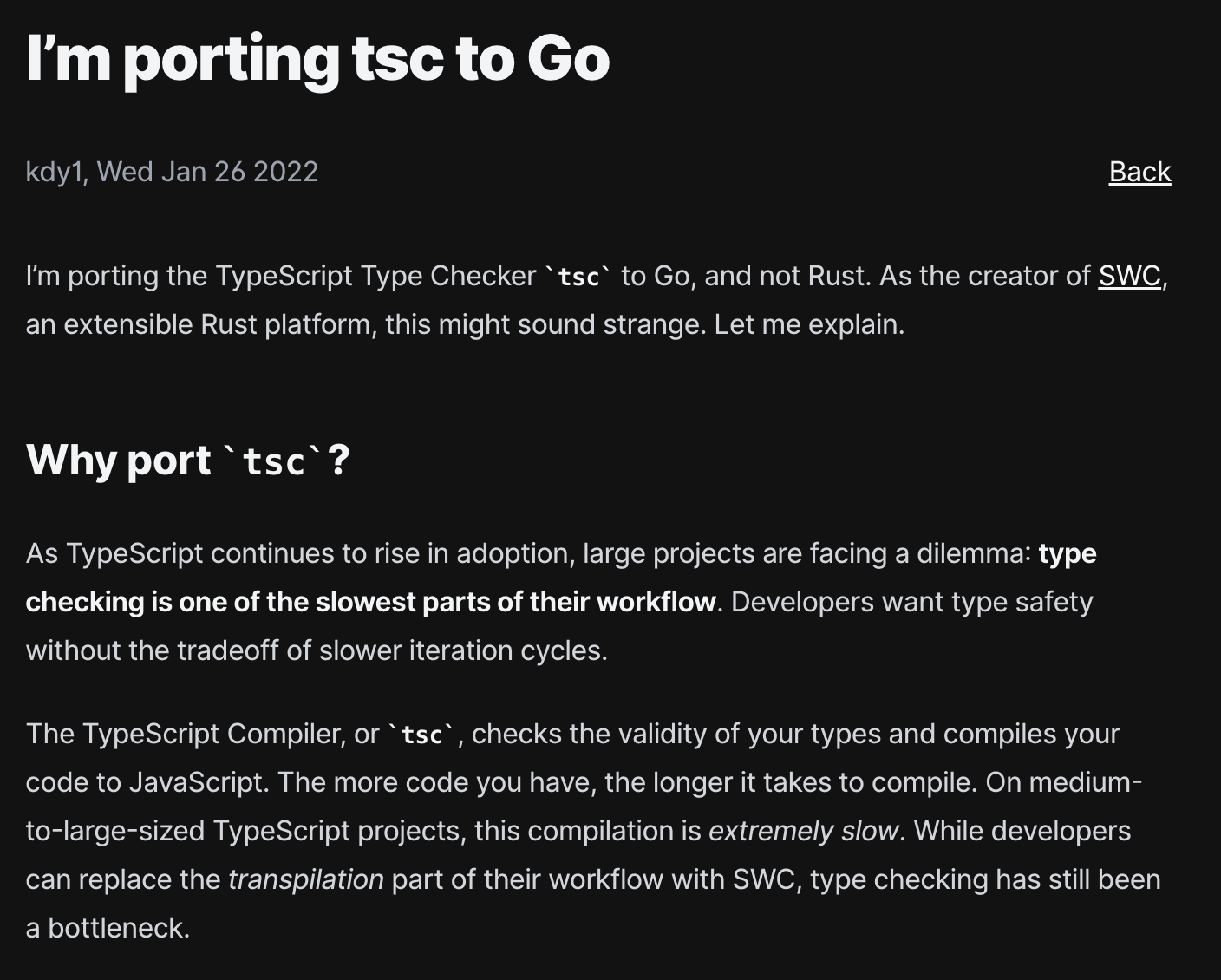
https://kdy1.dev/posts/2022/1/tsc-go
MicheleRivaCode

MicheleRivaCode


MicheleRivaCode

@MicheleRiva

@MicheleRivaCode

/in/MicheleRiva95

www.micheleriva.dev


Copy of Compiling and bundling JS, the painless way - 1hr
By Michele Riva
Copy of Compiling and bundling JS, the painless way - 1hr
- 837



